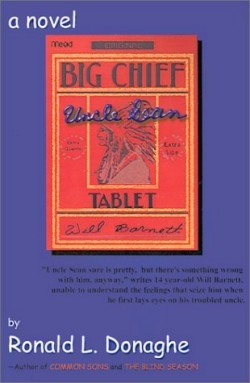Uncle Sean
As a barn on a deserted farm in Southwest New Mexico is torn down, an
old box sealed with disintegrating duct tape drops to the barn’s floor. The thirty-year-old contents-a Big Chief Tablet, a letter, dog tags from the Vietnam War, and a spiral notebook-tell a story. Twenty-two-year-old Sean had come to live and work with his oldest sister’s family in 1969, after having been discharged from the military and spending time in a hospital suffering a nervous breakdown.
In this novel, the first in the Journals of Will Barnett series, the author shares a compelling tale of a teenage boy coming out on his family’s farm. Fourteen-year-old Will was acting as right-hand man to his stern father in running the farm. Uncle Sean confided to Will that he was gay and that his boyfriend in the military was killed by friendly fire for being gay. Sean became the boy’s role model and mentor, the two became inseparable, and Will fell in love with his uncle. Although Sean loved Will as a nephew and helped him to face his own sexual orientation, he knew he could never be more than a mentor to him. Eventually Sean realized that he must leave the farm to enable Will’s growth.
Will became despondent; his grades plummeted as his anger and feelings of abandonment overcame him. Months passed before Will finally accepted a phone call from Sean, in which he mentioned a letter and dog tags hidden in the barn. Will’s journal reads: “I remember something that Uncle Sean had said, when he stole his boyfriend’s tags when he was killed-he had to have something solid to bring him back and Uncle Sean had done that for me.”
Donaghe’s magic in crafting this tale was writing Will’s journal in the voice of a fourteen-year-old. The journal continues with more maturity four years later when Will is facing adulthood. The book is so realistic that one wonders what has become of Sean and Will since the box was stowed away in the barn thirty years ago.
Uncle Sean is valuable for gay teens. Parents will gain a better understanding of their sons, and secondary educators will acquire needed insight into a subject too often neglected. The novel is a natural for high school and public libraries.
Reviewed by
John R. Selig
Disclosure: This article is not an endorsement, but a review. The publisher of this book provided free copies of the book to have their book reviewed by a professional reviewer. No fee was paid by the publisher for this review. Foreword Reviews only recommends books that we love. Foreword Magazine, Inc. is disclosing this in accordance with the Federal Trade Commission’s 16 CFR, Part 255.

